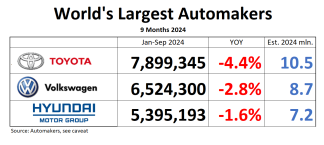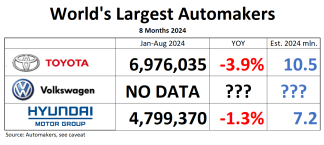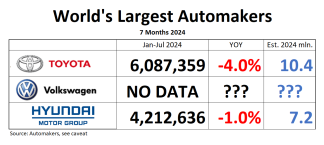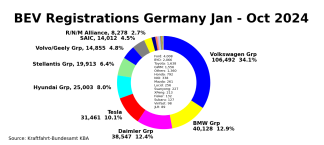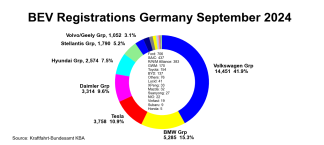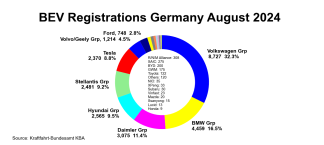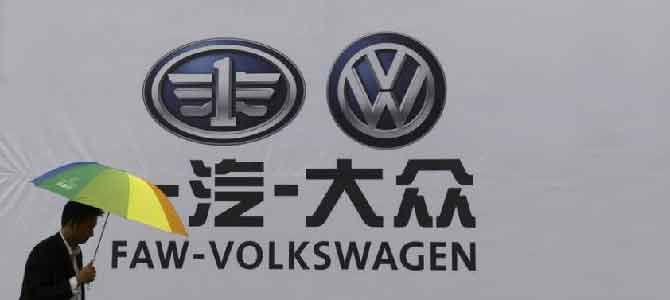
Preparing for the storm?
Consolidation has been the law of the auto industry ever since Ford’s assembly lines unlocked the brutal logic of scale, but fears that the US and Chinese markets may be cooling have automakers even more anxious to grab quick growth by merging. Last week, Fiat Chrysler Automobiles CEO Sergio Marchionne gave voice to the industry’s building anxiety by all but apologizing for his industry’s low rate of return on capital and threatening to explore mergers with Silicon Valley firms if no automaker wanted to acquire it. Marchionne’s position may be more desperate than some of his better-established competitors, but his basic logic is resounding across the auto industry.
When trading in shares of the Chinese automakers First Auto Works and Dongfeng (known until 1992 as “Second Auto Works”) were halted this week, the market’s initial read was that a merger between two of China’s biggest automakers was in the works. Dongfeng issued a swift denial of any merger plans but the Chinese state council shook up leadership at the two state-owned automakers, replacing the chairman at each with a man who had previously served at the other. With its automakers outmatched even in their home market, China appears to be pushing two of its “big four” manufacturers closer in hopes of creating a national champion with the scale to take on the global majors.
If merged, Dongfeng and F.A.W. would become a 6.2 million unit automaker (based on 2014 production volume), putting it in seventh place on the list of global giants just behind Ford. In previous predictions of industry consolidation, Marchionne had warned that no automaker could survive long-term at volumes below 5 million units per year once Chinese automakers become globally competitive. With FCA still just short of that volume goal and struggling mightily to survive, the prospect of a Chinese manufacturer leaping past it will doubtless keep Marchionne up at night.
But, as Marchionne’s audacious Fiat-Chrysler alliance proves, scale alone is no guarantee of success for any automaker. Simply slapping F.A.W. and Dongfeng together may not actually create a globally competitive automaker, considering both automakers remain heavily dependent on foreign automakers for the technology and brands consumers crave. Dongfeng’s 14% stake in struggling French automaker PSA Peugeot Citroen has widened into a joint-developed deal for a new compact car platform. Adding PSA to an F.A.W.-Dongfeng alliance could create scale that rivals the top tier of global majors and bring needed R&D capabilities to the table, but it would also bring its own problems, most critically more globally weak brands and a surfeit of expensive European production capacity.
Unlike Marchionne, who seems bent on all-out acquisition, PSA’s CEO Carlos Tavares made it clear at the Shanghai Auto Show that he is willing to discuss alliances but shows no interest in ending cooperation with Toyota. Meanwhile, the French government maintains a 14% stake in PSA and could move to block a takeover by Dongfeng if French jobs are at risk. Indeed, just as Dongfeng and FAW have resisted their governments’ pressure to merge, many automakers are trying to remain as independent as possible by cooperating with a variety of competitors on platform, drivetrain and vehicle development. In spite of the tyranny of scale that rules the industry, the instinct to fight for independence remains strong.
But as much as China’s “First” and “Second” auto companies might cling to their independent identities, they face more than mere economic pressure to come together. The corruption investigations that brought about the chairman-swap at Dongfeng and FAW were part of a campaign by president Xi Jinping’s faction to wrest patronage of the auto industry from the clique led by former president Jiang Zemin. Even if a FAW-Dongfeng merger does not immediately produce a globally competitive Chinese national champion automaker, it would marginalize the Jiang-controlled Shanghai Auto Industry Corp and create a clear national champion under Xi’s patronage. This possible outcome alone creates huge incentives for Beijing to push its “First” and “Second” auto companies together. And if the global pecking order is shaken up by the creation of a Chinese automotive monster, it could kick off a wave of consolidation that could change the car industry forever.
